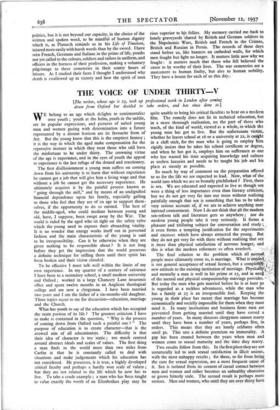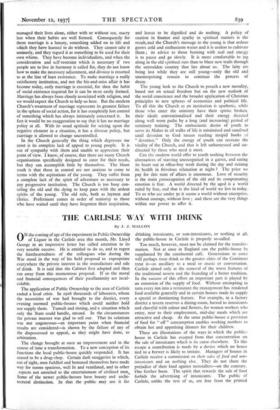THE VOICE OF UNDER THIRTY-V
[The writer, whose age is 25, took up professional work in London after coming down from Oxford but decided to take orders, and has since done so.] WE belong to an age which delights to sentimentalise over youth ; youth at the helm, youth in the saddle, are its popular expressions, and pictures of naked young men and women gazing with determination into a future represented by a distant horizon are its favourite form of Art. But the young know that this is the emptiest fantasy ; it is the way in which the aged make compensation for the repressive manner in which they treat those who still have. the misfortune to be under thirty. The crowning virtue of the age is experience, and in the eyes of youth the appeal to experience is the last refuge of the dotard and reactionary.
The first disillusionment a young man suffers on coming down from his university is to learn that without experience he cannot get a job that will give him a living wage and that without a job he cannot get the necessary experience. He ultimately acquires it by the painful process known as " going through the mill," and by means of an undignified financial dependence upon his family, especially galling to those who feel that they are of an age to support them- selves, if the opportunity to do so existed. The best of the middle-aged, who could mediate between young and old, have, I suppose, been swept away by the War. The world is ruled by the aged who sit tight on the safety valve which the young need to express their abounding vitality. It is no wonder that energy works itself out in perverted fashion and the main characteristic of the young is said to be irresponsibility. Can it be otherwise when they are given nothing to be responsible about ? It is not long before they get the impression that the world possesses a definite technique for stifling them until their spirit has been broken and their vision clouded.
To be effective I must talk well within the limits of my own experience. In my quarter of a century of existence I have been to a secondary school, a small modern university and Oxford ; worked in a large Chancery Lane insurance office and spent twelve months in an Anglican theological college and am now a clergyman. I have been married two years and I am the father of a six-months-old daughter. Three topics occur to me for discussion—education, marriage and the Church.
What has youth to say of the education which has occupied the main portion of its life ? The greatest criticism I have to make is contained in the question, " Why is the process of coming down from Oxford such a painful one ? " The purpose of education is to create character—that is the avowed aim of all educationists. The difficulty is that their idea of character is too static ; too much centred around abstract ideals and scales of values. The first thing a man finds in the world more than two miles from Carfax is that he is constantly called to deal with situations and make judgements which his education has not considered. He possesses, it is true, a highly developed critical faculty and perhaps a hardly won scale of values ; but they are not related to the life which he now has to live. To take a crude example ; a man who has been taught to value exactly the worth of an Elizabethan play may be quite unable to bring his critical faculties to bear on a modern film. The remedy does not lie in technical education, but in a more thorough realisation, on the part of those who teach, of the kind of world, viewed as a whole, in which the young man has got to live. But the unfortunate victim, whether he leaves school at 16 or a university at 22, is caught in a cleft stick, for the man who is going to employ him rigidly insists that he takes his school certificate or degree, and when he has got it, employs him on sufferance as one who has wasted his time acquiring knowledge and culture as useless luxuries and needs to be taught his job and his place as sternly as possible.
So much by way of comment on the preparation offered to us for the life we are expected to lead. Now, what of the world into which we are so brutally pitchforked ? First, there is sex. We are educated and expected to live as though sex were a thing of less importance even than literary criticism, but we do not get very far into our teens without realising painfully enough that sex is something that has to be taken very serious account of, if we are to achieve anything near internal contentment. Now I do not think that all the modern sex-reform talk and literature gets us anywhere ; nor do modern young people take it very seriously. It forms a pleasant and titillating subject for conversation and study ; it even forms a tempting justification for the experiments and excesses which have always attracted the young. But they do not get very far with these without realising that sex is more than physical satisfaction of nervous hunger, and this is what the modern reformers so often overlook.
The final solution to the problem which all normal., people must ultimately come to, is marriage. What is needed, is not general acceptance of sexual licence, but a comple new attitude to the existing institution of marriage. Physically:, and mentally a man is well in his prime at 25, and in need of the mental and physical companionship marriage provides. - But today the man who gets married before he is at least 3o I% is regarded as a reckless adventurer, while the man who has a family at 25 is an irresponsible fool. Keeping the young in their place has meant that marriage has become economically and socially impossible for them when they most need it. In many institutions and business firms men are prevented from getting married until they have served a number of years. In many dioceses clergymen cannot marry until they have been a number of years, perhaps five, in orders. This means that they are lonely celibates often until 3o. This sets a definite premium on immorality. A gap has been created between the years when men and women come to sexual maturity and the time they marry.
Two results follow from this. In the first place they are not unnaturally led to seek sexual satisfaction in illicit unions, with the most unhappy results ; for these, so far from being the cure for sexual repression, are a most frequent cause of it. Sex is isolated from its context of casual contact between men and women and either becomes an unhealthy obsession or grows bitterly stale. The second result is perhaps more serious. Men and women, who until they are over thirty have managed their lives alone, either with or without sex, marry late when their habits are well formed. Consequently for them marriage is a luxury, something added on to life and which they- have to do -without. They cannot-take' it seziously, and they regard it as something to be used for their own whims. They have become individualists, and when the consideration and self-restraint which is necessary if two people are to live in harmony is called for, they do not know how to make the necessary adjustment, and divorce is resorted to as the line of least resistance. To make marriage a really satisfactory institution, and not the hit-and-miss affair it has become today, early marriage is essential, for then the habit of social existence required for it can -be most easily formed. Marriage has always been closely associated with religion, and we would expect the Church to help us here. But the modem Church's treatment of marriage represents its greatest failure in the sphere of social action, for it has completely lost control of something which has always intimately concerned it. In fact it would be no exaggeration to say that it has no marriage policy at all. With its usual aptitude for seizing upon the negative element in a situation, it has a divorce policy, but marriage is allowed to change uncontrolled.
In the Church generally the thing which depresses me most is its complete lack of appeal to young people. It is out of sympathy with them and unable to appreciate their point of view. I know, of course, that there are many Church organisations specifically designed to cater for their needs, but they can accomplish little by themselves. The blunt truth is that those in control are not anxious to come to terms with the aspirations of the young. They suffer from a complete lack of the spirit of adventure so necessary to any progressive institution. The Church is too busy con- soling 'the old and the dying to keep pace with the ardent spirits of the young. The old rule, both as laymen and -clerics. Preferment conies in order of seniority to those Who have waited until they have forgotten their inspiration, and learnt to be dignified and do nothing. A policy of caution in finance and apathy in spiritual matters is the result, and the Church's message to the young is that ardour grows cold and enthusiasm wanes and it is useless to cultivate them ; its advice to those burning with zeal, and energy is to pause and go slowly. It is more comfortable to jog along in the old spiritual ruts than to blaze new trails through the untrodden country that lies about us. The laity are being lost while they are still young—only the old and unenterprising remain to continue the process of decay.
The young look to the Church to preach a new morality, based not on sexual freedom but on the new outlook of the social conscience and the broader application of Christian principles to new spheres of economics and political life. To all this the Church as an institution is apathetic, while those who enter the ministry have their spirits broken, their ideals conventionalised and their energy directed along well worn paths by a long (and increasing) period of seminary training. The enthusiastic desire of youth to serve its Maker in all walks of life is minimised and canalised until devotion to God means reading insipid books of " devotion." Only the energy of youth can recreate the vitality of the Church, and that is left unharnessed and un- directed by those who need it most.
Can the modern world offer to youth nothing between the alternatives of starving unrecognised in a garret, and eating its heart out at office-boy work during the day and ruining its health in frivolous relaxation at night ? The price we pay for this state of affairs is enormous. Love of security is the main preoccupation of the old and its compensating emotion is fear. A world directed by the aged is a world ruled by fear, and that is the kind of world we live in today. To us who are under 3o it seems a world without enterprise, without courage, without love ; and these are the very things within our power, to offer it.















































 Previous page
Previous page